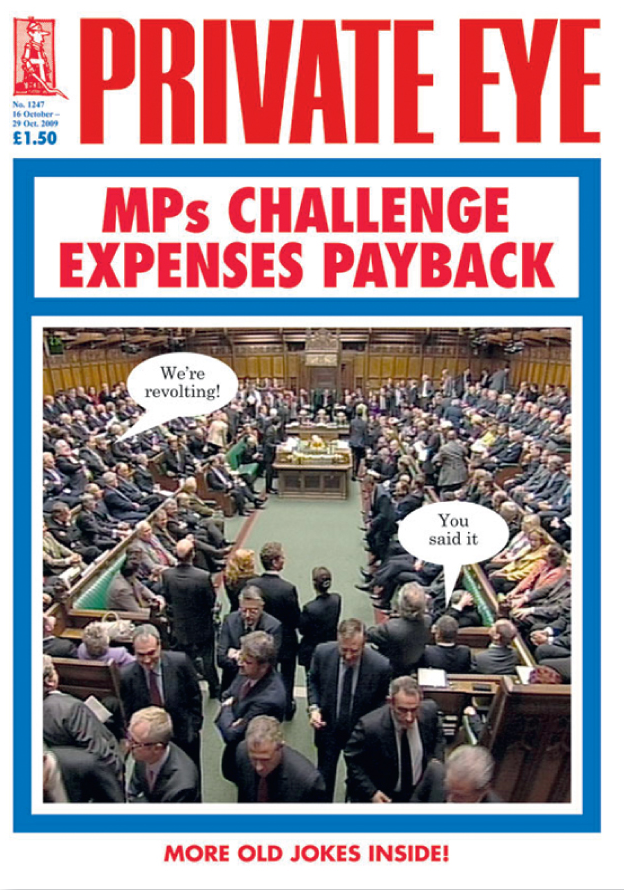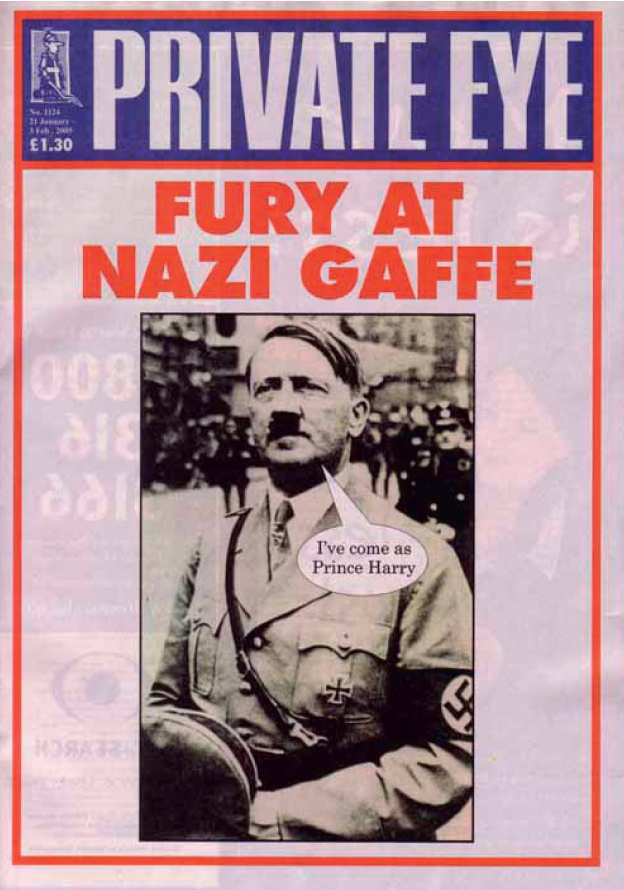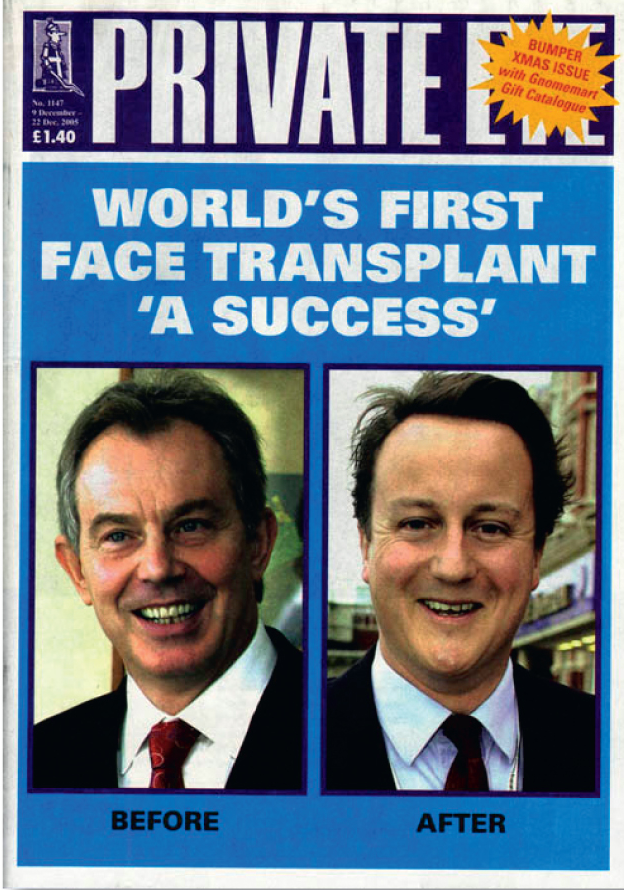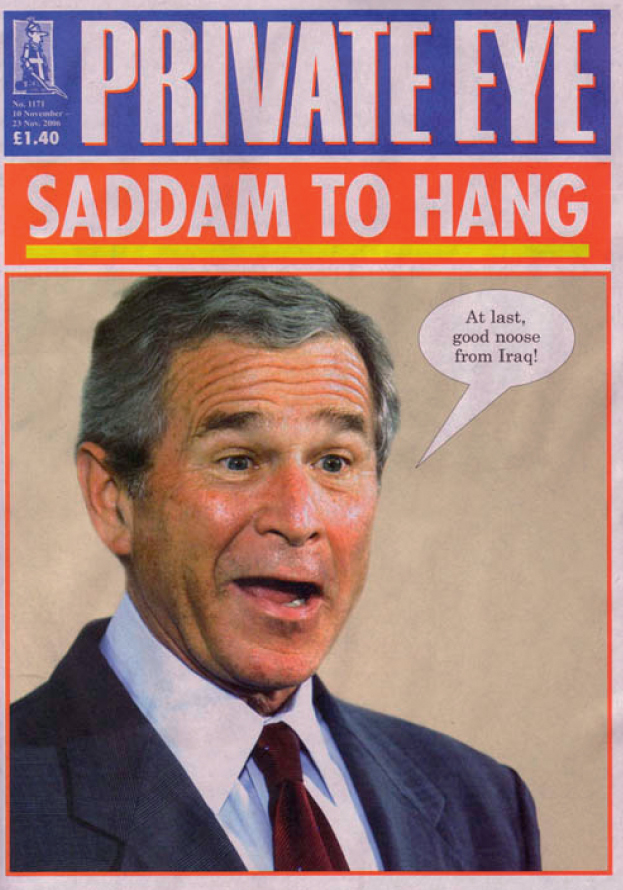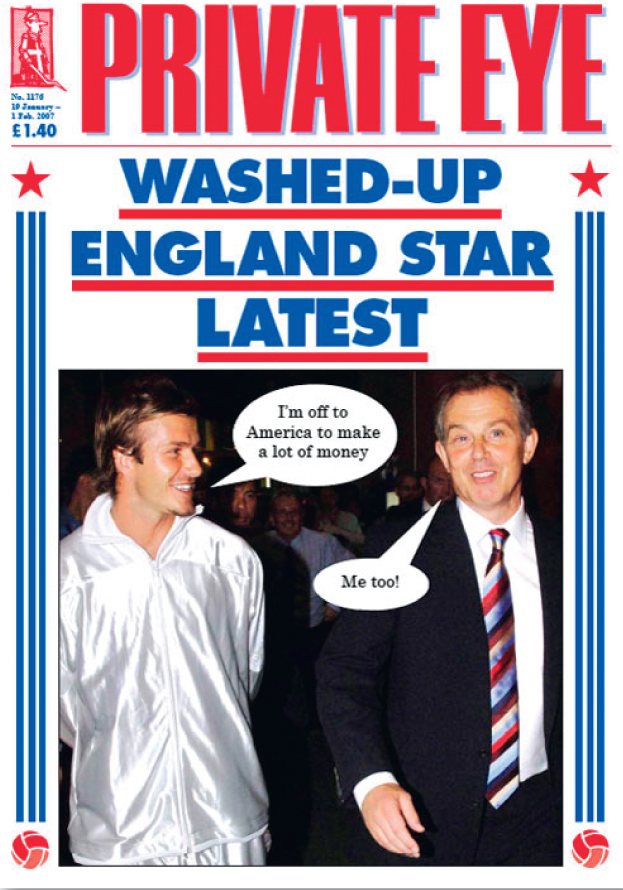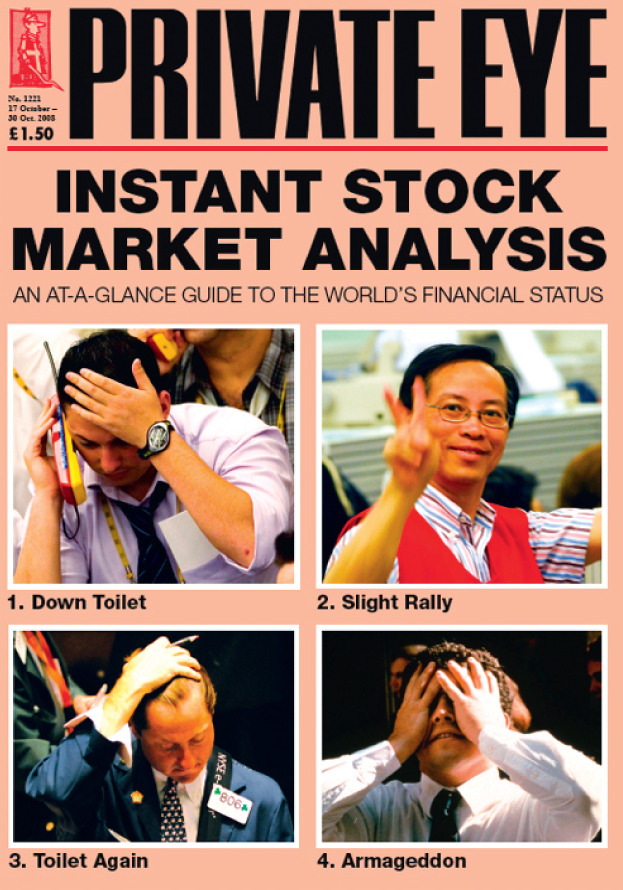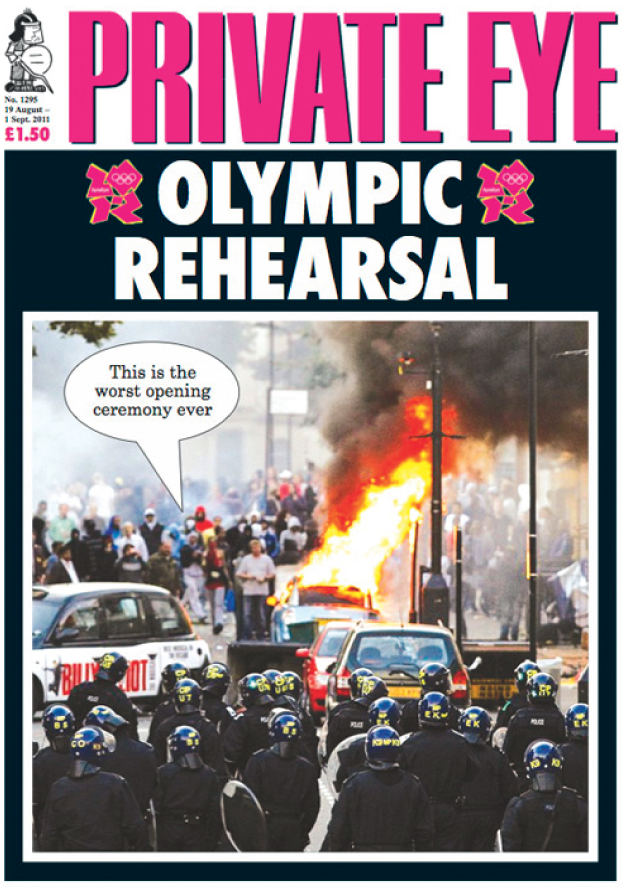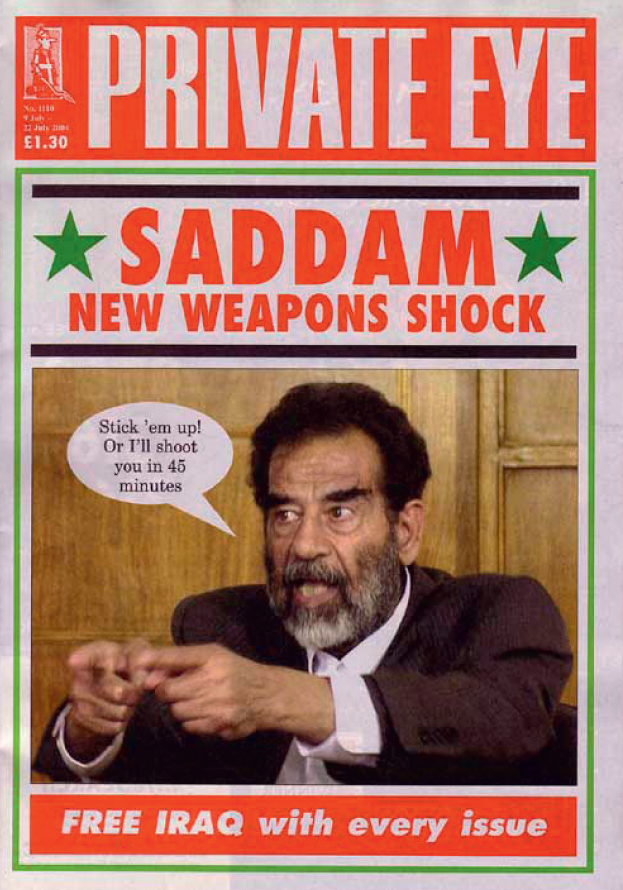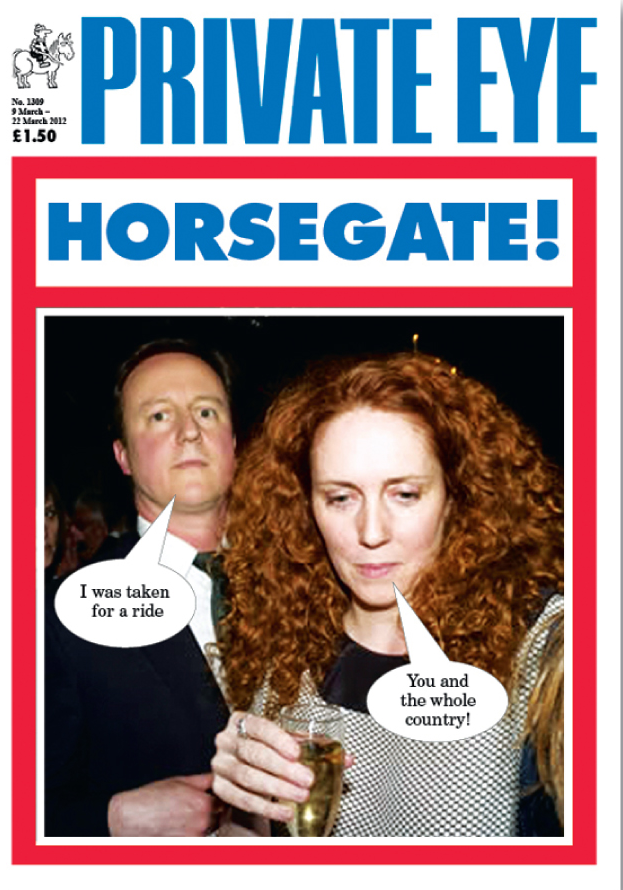We first met Private Eye editor Ian Hislop in 2008 when we went round to his office and drank tea and bitched about the state of British media. Looking back at the last decade of British journalism seemed like the kind of thing we should do on our anniversary, so we called on Hislop again. Obviously both Private Eye and VICE have been fighting the good fight for the last ten years, but everyone else has been a right dick and a lot has changed: David Kelly, Leveson, Cameron, Savile, pay walls, free sheets, Twitter, that righthand column on the Mail Online, endless cooking supplements, Tanya Gold and Piers Morgan. Anyway, we met with Ian again to talk some more about shitty fucking crappy stupid journalism.
Advertisement
VICE: Hello Ian. Let’s talk about the last ten years of media – I imagine you’ve been paying attention. Broadly speaking, what’s changed?
Ian Hislop: Technology has accelerated at an extraordinary rate and old hacks have had to keep up. We have to remember which bits of journalism are quite good and hang on to them. My little world is full of middle-aged men getting excited by digital and imagining this is the future without really understanding it at all, but I’m not nearly as gloomy about print as anyone else. I think it does certain things much better. The success of a magazine like VICE is evidence in itself that print is not dead.We also have quite a lot of stuff online, you know. Do you think the internet lends itself to investigative journalism like print, or does it just lend itself to gossip and brief moral outrage?
Well, obviously I think print does investigative journalism well and can balance that by doing entertainment, so you have an odd mix. What you can’t get online is that dedication to journalism which is very expensive and requires a lot of time. People investigate things and nothing happens – you don’t get a story and people say, “Well, that’s a waste of money.” It isn’t, it’s part of the next story that will be any good. Online is much better at opinion and “bleugh”.“Bleugh” kind of sums up the Mail Online. “Bleugh” and “teenage tits”. What do you think about the fact that it’s the most popular news source on the planet these days?
I think that’s incredibly depressing. The Daily Mail, whatever its faults, in its print version does have some journalism – it covers stories, it ask questions and puts information out there. It does a lot of other things that people hate, but it does do that. If Mail Online is the future of journalism, it’s just sad. There’s a huge amount of money spent on the cult of celebrity – paying people to hang around for days in the hope of seeing Kim Kardashian fall over or get out of a car.
Ian Hislop: Technology has accelerated at an extraordinary rate and old hacks have had to keep up. We have to remember which bits of journalism are quite good and hang on to them. My little world is full of middle-aged men getting excited by digital and imagining this is the future without really understanding it at all, but I’m not nearly as gloomy about print as anyone else. I think it does certain things much better. The success of a magazine like VICE is evidence in itself that print is not dead.We also have quite a lot of stuff online, you know. Do you think the internet lends itself to investigative journalism like print, or does it just lend itself to gossip and brief moral outrage?
Well, obviously I think print does investigative journalism well and can balance that by doing entertainment, so you have an odd mix. What you can’t get online is that dedication to journalism which is very expensive and requires a lot of time. People investigate things and nothing happens – you don’t get a story and people say, “Well, that’s a waste of money.” It isn’t, it’s part of the next story that will be any good. Online is much better at opinion and “bleugh”.“Bleugh” kind of sums up the Mail Online. “Bleugh” and “teenage tits”. What do you think about the fact that it’s the most popular news source on the planet these days?
I think that’s incredibly depressing. The Daily Mail, whatever its faults, in its print version does have some journalism – it covers stories, it ask questions and puts information out there. It does a lot of other things that people hate, but it does do that. If Mail Online is the future of journalism, it’s just sad. There’s a huge amount of money spent on the cult of celebrity – paying people to hang around for days in the hope of seeing Kim Kardashian fall over or get out of a car.
Advertisement
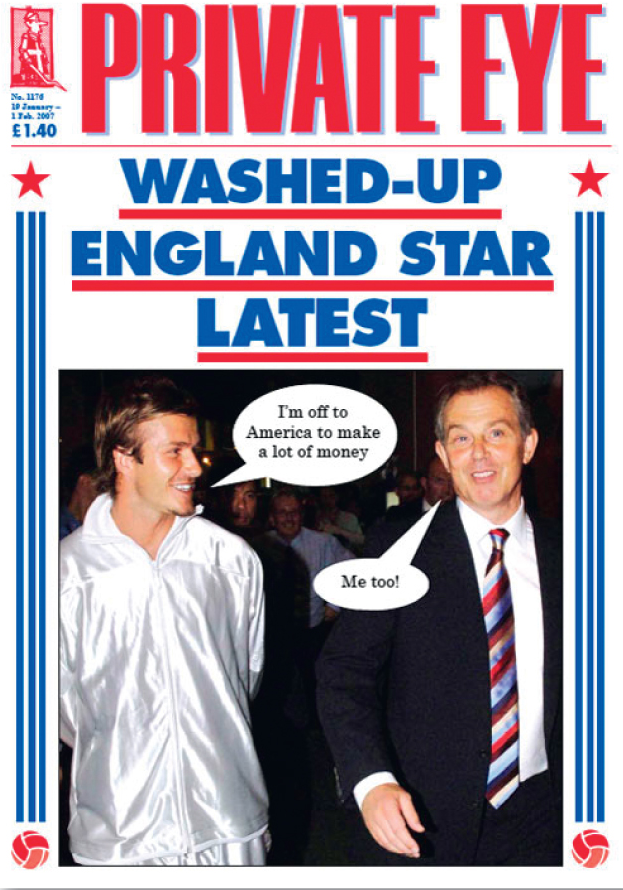
Yeah, the righthand side of the site, the “sidebar of shame” (which is actually called Femail Today, for some horrible reason) seems enough to condemn the entire practice of journalism. What do you make of it?
It’s creepy. You think: is that what millions of people from round the world want? I’m not trying to be snotty – I’m as bad as anyone else. If someone says, “Have you seen the YouTube video with the hamster that’s doing the thing,” I’m perfectly happy to watch it and laugh. But that column is perviness on a vast scale, isn’t it?Do you find it weird that a right-wing paper like the Mail has become so mainstream in its online incarnation?
It’s extraordinary. The commercial imperative is split between quite a prudish, old-fashioned print paper and creepy semi-porn online, and the only connection seems to be ownership.So with newspapers willing to sell out their principles for increased traffic, do you think it could end in some weird partnerships, say between the Guardian and the Mail?
Who knows what will happen? In a world where Richard Desmond is allowed to buy the Express, which writes editorials on how the contestants on X Factor are not wearing enough clothes, and at the same time run porn channels where people aren’t wearing any clothes at all, any media mix seems possible.One of the things that really pisses me off is the way previously serious broadsheets are so desperate to become “cool” bourgeois lifestyle magazines. It feels like the planet has got more serious as time’s gone on, and proper newspapers have just started writing about Nicki Minaj and how to correctly braise baby asparagus.
Yeah, I suppose that’s one of the survival mechanisms. If straightforward headlines are going to be covered on the BBC website, or on their own websites, then they’ve got to find something else to sell to their readers. There are a lot more features than there ever were. I don’t mind any of that, though, because you have to make a package. You could say the same about Private Eye. I think if we just ran the investigative stories without the jokes we’d probably sell fewer copies than the New Statesman. But if broadsheets become magazines about gardening, cooking and what’s on the telly without news at the heart of it then they may find that they have nothing to sell.
It’s creepy. You think: is that what millions of people from round the world want? I’m not trying to be snotty – I’m as bad as anyone else. If someone says, “Have you seen the YouTube video with the hamster that’s doing the thing,” I’m perfectly happy to watch it and laugh. But that column is perviness on a vast scale, isn’t it?Do you find it weird that a right-wing paper like the Mail has become so mainstream in its online incarnation?
It’s extraordinary. The commercial imperative is split between quite a prudish, old-fashioned print paper and creepy semi-porn online, and the only connection seems to be ownership.So with newspapers willing to sell out their principles for increased traffic, do you think it could end in some weird partnerships, say between the Guardian and the Mail?
Who knows what will happen? In a world where Richard Desmond is allowed to buy the Express, which writes editorials on how the contestants on X Factor are not wearing enough clothes, and at the same time run porn channels where people aren’t wearing any clothes at all, any media mix seems possible.One of the things that really pisses me off is the way previously serious broadsheets are so desperate to become “cool” bourgeois lifestyle magazines. It feels like the planet has got more serious as time’s gone on, and proper newspapers have just started writing about Nicki Minaj and how to correctly braise baby asparagus.
Yeah, I suppose that’s one of the survival mechanisms. If straightforward headlines are going to be covered on the BBC website, or on their own websites, then they’ve got to find something else to sell to their readers. There are a lot more features than there ever were. I don’t mind any of that, though, because you have to make a package. You could say the same about Private Eye. I think if we just ran the investigative stories without the jokes we’d probably sell fewer copies than the New Statesman. But if broadsheets become magazines about gardening, cooking and what’s on the telly without news at the heart of it then they may find that they have nothing to sell.
Advertisement
Except the celebrity writers with huge Twitter followings. How do you think Twitter has affected journalism?
The bad side is in this country, where it creates clouds of viral ignorance that swoop around picking the wrong targets and cocking it up. There are no rules, no standards, no verification, so a lot of what is on there is rubbish. The main effect of it here is that it allows newspapers to not bother to interview celebrities because they can just copy what they’re saying on Twitter. It was important in the Arab Spring and China in the freeing-up of information, which is the good side.So do you agree with the media’s idea that the Arab Spring was a “Twitter revolution”?
Well, I think they identified the messenger as the message. But that is the way that generation were vocalising their grievances. The Arab population is very young and it was important for them to communicate outside normal structures.
The bad side is in this country, where it creates clouds of viral ignorance that swoop around picking the wrong targets and cocking it up. There are no rules, no standards, no verification, so a lot of what is on there is rubbish. The main effect of it here is that it allows newspapers to not bother to interview celebrities because they can just copy what they’re saying on Twitter. It was important in the Arab Spring and China in the freeing-up of information, which is the good side.So do you agree with the media’s idea that the Arab Spring was a “Twitter revolution”?
Well, I think they identified the messenger as the message. But that is the way that generation were vocalising their grievances. The Arab population is very young and it was important for them to communicate outside normal structures.

Just the other day your nemesis Piers Morgan became embroiled in the phone hacking scandal through his editorship of the Daily Mirror. Are you chuffed?
It’s very exciting, isn’t it! He’ll have a case to answer.His decade has been completely bizarre. He began the decade by getting sacked by the Daily Mirror for printing faked photos of British soldiers torturing Iraqi civilians (which, a year before 7/7, wasn’t a very helpful move for the country’s PR). But just a few years later and he’s a genuine international celebrity, a cuddly talent show patriarch. Does that surprise you?
Yes, but then everything surprises me.
It’s very exciting, isn’t it! He’ll have a case to answer.His decade has been completely bizarre. He began the decade by getting sacked by the Daily Mirror for printing faked photos of British soldiers torturing Iraqi civilians (which, a year before 7/7, wasn’t a very helpful move for the country’s PR). But just a few years later and he’s a genuine international celebrity, a cuddly talent show patriarch. Does that surprise you?
Yes, but then everything surprises me.
Advertisement
Do you think it says anything about society that he has made it as a celeb?
There seems to be a sort of moral short-term memory failure. Whenever I see Alastair Campbell talking, I think: “I’m not sure you should be allowed to say anything about anything much really.” And when Piers [Morgan] comes forward, you just think: “Really?” And Tony Blair, a man who constantly looks like he’s playing his own character in an action movie about himself, is worst of all. He’s furious at the thought that people are still angry about the Iraq War. “Can’t we move on?” he asks. He hates history, he hates the past and he hates analysing.But the media still take him seriously as a commentator and he’s made loads of money on the after-dinner speaker circuit.
There used to be a proverb about success breeding success. Paul Foot [the late Private Eye investigative journalist] reckoned that nowadays failure breeds success – the best way to be really successful was just to be useless in whatever you did and then you moved on to even greater rewards. Footie was right about most things.What do you hope comes out of the Leveson Inquiry?
What I think is brilliant is the information that came out. The one thing I wouldn’t like to come out of it is statutory regulation. Everything that went wrong was illegal. The newspapers and the police were so matey that the police didn’t enforce that law. If a newspaper editor is mates with the prime minister and the senior executives are basically pushing him around, why would he be worried by a copper? When you add in the relationships between the police and the politicians, you’ve got a triangle which allowed all that to happen.
There seems to be a sort of moral short-term memory failure. Whenever I see Alastair Campbell talking, I think: “I’m not sure you should be allowed to say anything about anything much really.” And when Piers [Morgan] comes forward, you just think: “Really?” And Tony Blair, a man who constantly looks like he’s playing his own character in an action movie about himself, is worst of all. He’s furious at the thought that people are still angry about the Iraq War. “Can’t we move on?” he asks. He hates history, he hates the past and he hates analysing.But the media still take him seriously as a commentator and he’s made loads of money on the after-dinner speaker circuit.
There used to be a proverb about success breeding success. Paul Foot [the late Private Eye investigative journalist] reckoned that nowadays failure breeds success – the best way to be really successful was just to be useless in whatever you did and then you moved on to even greater rewards. Footie was right about most things.What do you hope comes out of the Leveson Inquiry?
What I think is brilliant is the information that came out. The one thing I wouldn’t like to come out of it is statutory regulation. Everything that went wrong was illegal. The newspapers and the police were so matey that the police didn’t enforce that law. If a newspaper editor is mates with the prime minister and the senior executives are basically pushing him around, why would he be worried by a copper? When you add in the relationships between the police and the politicians, you’ve got a triangle which allowed all that to happen.
Advertisement
Who came out of the whole thing worse, the Tories or Labour?
The Tories are in power so obviously they got it in the neck more and they are worthy of that criticism. But Gordon Brown’s wife organised a sleep-over party in Chequers for Rupert Murdoch’s missus. It was her birthday. Why is she having a birthday party in this huge publicly funded building that is meant for offices of state? Is it there to amuse Wendi Deng? I don’t think it is. Blair is godfather to one of the Murdoch children. He appeared at the River Jordan in silly white robes thinking he’s the messiah again. Margaret Thatcher used to call the editor of the Sun in and tell him what to write. Over the last ten years, the Sun has called in the prime minister and told him what to do.How does the whole shit show compare to the past? Were journalists more heroic in your youth?
I don’t subscribe to the view that journalism today is the worst it has ever been and much worse than the old days. When I was first in journalism the Sun was in its pomp, the tabloids were calling Elton John a poof – they were pretty unbridled. Today’s specific phone hacking stuff is very shocking, which is obviously a technological innovation. But Private Eye has run two pages called “Street of Shame” for years, for obvious reasons: it’s filled with journalists behaving badly and has been for 50 years. If you look at the way we’ve always covered journalism, then you’d think it hasn’t changed hugely.
The Tories are in power so obviously they got it in the neck more and they are worthy of that criticism. But Gordon Brown’s wife organised a sleep-over party in Chequers for Rupert Murdoch’s missus. It was her birthday. Why is she having a birthday party in this huge publicly funded building that is meant for offices of state? Is it there to amuse Wendi Deng? I don’t think it is. Blair is godfather to one of the Murdoch children. He appeared at the River Jordan in silly white robes thinking he’s the messiah again. Margaret Thatcher used to call the editor of the Sun in and tell him what to write. Over the last ten years, the Sun has called in the prime minister and told him what to do.How does the whole shit show compare to the past? Were journalists more heroic in your youth?
I don’t subscribe to the view that journalism today is the worst it has ever been and much worse than the old days. When I was first in journalism the Sun was in its pomp, the tabloids were calling Elton John a poof – they were pretty unbridled. Today’s specific phone hacking stuff is very shocking, which is obviously a technological innovation. But Private Eye has run two pages called “Street of Shame” for years, for obvious reasons: it’s filled with journalists behaving badly and has been for 50 years. If you look at the way we’ve always covered journalism, then you’d think it hasn’t changed hugely.
Advertisement
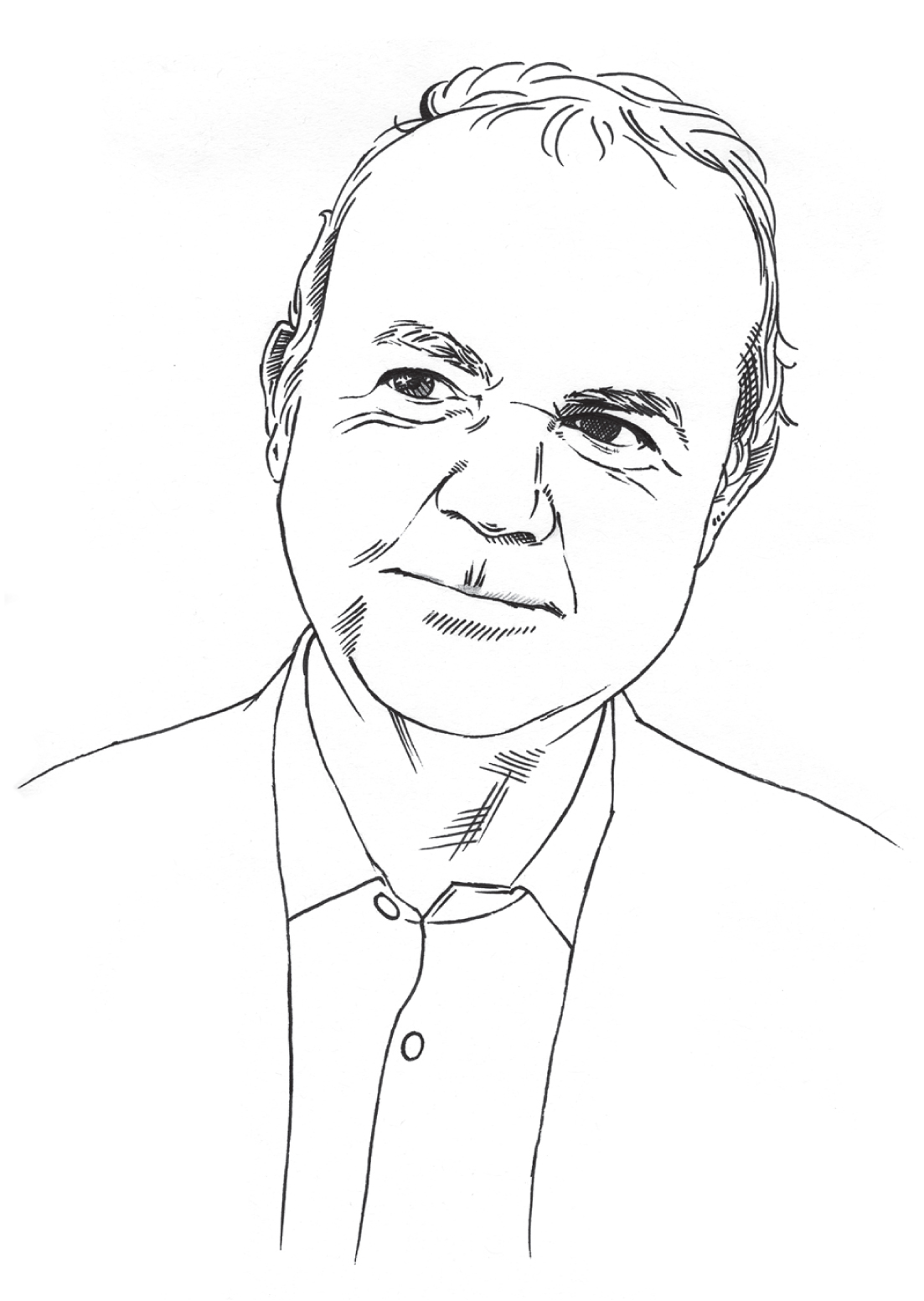
What do you think about blogs and the rise of citizen journalism? People were very excited about it a few years ago.
Too many blogs are about what one blogger said to another blogger and whenever I go on them I just get lost. The level of hatred they have for each other is far higher than the perceived injustice. I find that level of sustained anger quite difficult to read.So you don’t think it’s filling a journalistic vacuum?
I’m repeatedly telling people that the VICE generation are at some point going to have to decide whether they want to pay for what I think are the best things in life. If you download all the good films for free, nobody can afford to make films any more. If you download music it’s pretty hard to create music. With journalism, if you don’t want to pay for it you won’t get it. You’ll get opinion, you’ll get blogs, but you won’t get edited, tested, interesting, well-written journalism because people want to get paid for that.I suppose otherwise you get sugar daddies like Evgeny Lebedev funding journalism as a form of philanthropy.
Yeah. I’m very glad they are too. I’d rather that than nothing. But then we are back to the press barons of the 19th century.Yeah, I guess he’s like Charles Foster Kane but with a demented beard. Do you think it’s a problem that journalists, who are supposed to hold public figures to account, become celebrities in their own right?
Well, journalists are on the whole very thin-skinned, incapable of taking any criticism at all. We are the first to get furious, despite doling it out very freely to everyone else. History is peppered with angry and wounded fellow journalists. Andrew Marr was the classic example. He took out a super-injunction about having a child outside marriage with somebody else, which then turned out not to be his. But he had interviewed Gordon Brown about his pharmaceutical requirements, and David Blunkett, who had a child outside marriage himself. It was too hypocritical. Marr admitted he should never have taken it out. Without being absurdly optimistic, I think that particular rash of stupidity is gone.
Too many blogs are about what one blogger said to another blogger and whenever I go on them I just get lost. The level of hatred they have for each other is far higher than the perceived injustice. I find that level of sustained anger quite difficult to read.So you don’t think it’s filling a journalistic vacuum?
I’m repeatedly telling people that the VICE generation are at some point going to have to decide whether they want to pay for what I think are the best things in life. If you download all the good films for free, nobody can afford to make films any more. If you download music it’s pretty hard to create music. With journalism, if you don’t want to pay for it you won’t get it. You’ll get opinion, you’ll get blogs, but you won’t get edited, tested, interesting, well-written journalism because people want to get paid for that.I suppose otherwise you get sugar daddies like Evgeny Lebedev funding journalism as a form of philanthropy.
Yeah. I’m very glad they are too. I’d rather that than nothing. But then we are back to the press barons of the 19th century.Yeah, I guess he’s like Charles Foster Kane but with a demented beard. Do you think it’s a problem that journalists, who are supposed to hold public figures to account, become celebrities in their own right?
Well, journalists are on the whole very thin-skinned, incapable of taking any criticism at all. We are the first to get furious, despite doling it out very freely to everyone else. History is peppered with angry and wounded fellow journalists. Andrew Marr was the classic example. He took out a super-injunction about having a child outside marriage with somebody else, which then turned out not to be his. But he had interviewed Gordon Brown about his pharmaceutical requirements, and David Blunkett, who had a child outside marriage himself. It was too hypocritical. Marr admitted he should never have taken it out. Without being absurdly optimistic, I think that particular rash of stupidity is gone.
Advertisement
Present company excepted, is there hope for journalism yet?
The good thing about the hacking scandal is that the failures of journalism were uncovered by a journalist. That’s something to hold on to. It wasn’t an inquiry that turned it up, it wasn’t the police, it certainly wasn’t the government – they would have all happily done nothing. It was Nick Davies at the Guardian, and hats off. Journalism is quite difficult. Investigations can take months. You have to pay people and set it all up and it takes time and you might get nothing. So I do see why people wouldn’t want to do it. It’s troublesome and if it goes wrong there are legal costs and that’s expensive for proprietors. But I still think that if you do it well it should sell newspapers.“The good thing about the hacking scandal is that the failures of journalism were uncovered by a journalist.”Thanks Ian!Follow Simon on Twitter: @SimonChilds13Illustrations by Jenny HironsRead more from our 10th Anniversary Issue:Never Pitch Any Of These Things To Us AgainWarren Ellis Files a Report from the Year 2022An Interview with the Filmmaker Adam Curtis
The good thing about the hacking scandal is that the failures of journalism were uncovered by a journalist. That’s something to hold on to. It wasn’t an inquiry that turned it up, it wasn’t the police, it certainly wasn’t the government – they would have all happily done nothing. It was Nick Davies at the Guardian, and hats off. Journalism is quite difficult. Investigations can take months. You have to pay people and set it all up and it takes time and you might get nothing. So I do see why people wouldn’t want to do it. It’s troublesome and if it goes wrong there are legal costs and that’s expensive for proprietors. But I still think that if you do it well it should sell newspapers.“The good thing about the hacking scandal is that the failures of journalism were uncovered by a journalist.”Thanks Ian!Follow Simon on Twitter: @SimonChilds13Illustrations by Jenny HironsRead more from our 10th Anniversary Issue:Never Pitch Any Of These Things To Us AgainWarren Ellis Files a Report from the Year 2022An Interview with the Filmmaker Adam Curtis
